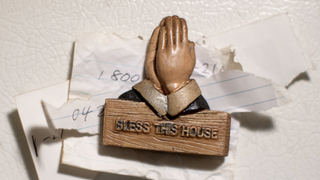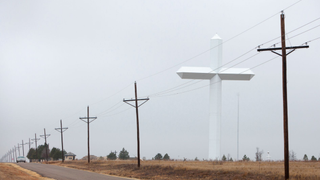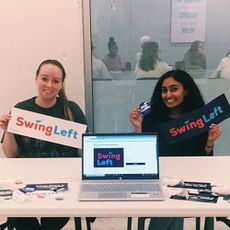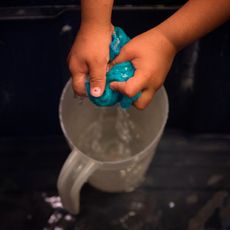The Daughters' Great Escape
Women raised by the Christian patriarchy are defined by complete subservience to their father, mastering homemaking skills and abstaining from college and career. But even as the ideology gains influence on a national stage, a small minority of brave young women are defying their families and churches to live life on their own terms.

Growing up, Eleanor Skelton was taught to respect her father’s God-given authority and obey his every wish. She dressed in long skirts and blouses buttoned to the top, and she avoided the color green because her dad didn’t like it. He had an “obsession with having no leftovers,” so Skelton stuffed herself until she’d gained an extra 20 pounds. Her family’s Colorado Springs–based fundamentalist Christian church banned TV and rock music “because syncopated music is a disorderly beat, and disorder comes from the devil,” Skelton, now 28, explains. She didn’t have friends and felt compelled to hit herself with rulers and belts if she did something bad.
Homeschooling was the way to train her “up in the way of the Lord,” she remembers being told, so Skelton memorized Bible verses and read books like those from the 19th-century Elsie Dinsmore children’s series—tales of a pious girl who struggled to remain submissive to a spiritually dubious father—in a windowless storage room in the back of her dad’s orthodontics office. “As a stay-at-home daughter, there are so many expectations that your subculture has of you,” Skelton says. “I had dreams and ideas outside of this box I was put in, and I just wanted so very much to be normal.” If you ask Skelton’s mother, many of her daughter’s strict rules were self-imposed. They were a result of following the lead of others at the family’s church, her mother says.
“Stay-at-home daughter” is a term used in some evangelical fundamentalist Christian homes to describe a woman who lives at home until marriage and is raised to submit to male authority. She’s homeschooled to protect her from worldly ideas and made to mimic her mother’s “helpmeet” role (a Scripture-inspired term defining women as their husbands’ helpers) until her mid- to late teens or early 20s, when her father approves a husband. Her wifely training includes helping to raise siblings and mastering what such families call “advanced homemaking skills,” ranging from menu planning and budgeting to interior design and disaster preparation. As the name suggests, stay-at-home daughters aren’t supposed to go to college or have a career; proponents describe independent women and egalitarian men as “destructive of civilization.”
For the uninitiated, it can be hard to believe such faith-based oppression still exists in 21st-century America. Stay-at-home daughterhood is one practice among a set of beliefs often referred to as “Christian patriarchy” (and in its less rigid forms, “complementarianism”), which places men’s authority over women and fathers’ authority over children. It’s seen as the way to protect a family from a life of sin in the modern world. “Christian patriarchy” is not a church in itself but a movement aimed at popularizing certain gender norms within a range of evangelical fundamentalist churches and families. It’s impossible to quantify how many believers are out there, but for those in the movement, the conviction that God wants women to submit to male authority is reinforced at church, in Bible studies, in children’s lessons, and in the media they consume. By selling life manuals and school curricula, as well as promoting conferences to strengthen families, a number of Christian patriarchy–preaching ministries have profited in the millions, even as the most well-known leaders have been sued for sexual harassment and assault.
A “stay-at-home daughter” is a woman who lives at home until marriage and is raised to submit to male authority.
In 2016, with the election of President Donald Trump, Christian patriarchy gained influence as those familiar with its beliefs assumed national roles. Vice President Mike Pence attended a church in Indianapolis whose lead minister has preached that women should submit to men’s spiritual authority. Secretary of Agriculture Sonny Perdue counts prominent patriarchy-preaching pastor Bill Gothard’s teachings as one of “his life’s greatest influences.” Former Arkansas governor Mike Huckabee, a 2016 Republican presidential candidate, has attended Gothard-led conferences, as has 2008 Republican vice-presidential nominee and ex–Alaska governor Sarah Palin. (After hearing a list of character qualities defined by Gothard—including faith, obedience, and meekness—at a conference in 2000, when she was mayor of Wasilla, Palin directed her city council to pass a resolution pledging that the city would uphold the 49 traits.) Roy Moore, the Alabama GOP Senate candidate who lost to Doug Jones in 2017’s special election after being accused of sexual misconduct by nine women, coauthored a Law and Government course published by the ministry of another leader, Doug Phillips, that questioned whether women should have the right to vote and directs people to vote against women who run for public office because the only role for women is in the home.
“The rhetorical impact of this ideology is far more pervasive than most people understand,” says Christy Mesaros-Winckles, communications chair at Adrian College in Michigan, who studies evangelical culture. “We have individuals who espouse Christian-patriarchy ideas who have access to the most powerful public officials in America.”

In lieu of a formal postsecondary education, many stay at- home daughters study advanced homemaking skills. Many in the movement preach against sending women to college.
Caught in the crosshairs are the women taught to believe rebellion is akin to witchcraft. But growing numbers of stay-at-home daughters are rejecting their upbringings. They’re awaking to their realities thanks to confessional websites that have cropped up in recent years: No Longer Quivering, Homeschoolers Anonymous, Spiritual Sounding Board, Love Joy Feminism, and Recovering Grace. Some are escaping via an informal network of safe houses run by former stay-at-home daughters. “It’s an underground movement,” says Skelton, a pioneer of the network with her Unboxing Project, which counts over 30 volunteers and half a dozen safe houses. “We’re like this really big family all over the nation.”
Stay In The Know
Get exclusive access to fashion and beauty trends, hot-off-the-press celebrity news, and more.
Rebecca, another stay-at-home daughter, had a relatively normal childhood in Saratoga, California. Then her family joined a patriarchy-preaching church when she was 12. “When we joined the church, it became clear our jobs were to be wives and mothers and daughters,” remembers Rebecca (whose last name has been omitted here), now 34, who as a kid harbored dreams of becoming a physicist. After her family joined the church, Rebecca realized if she wanted physics to be part of her life, it would be through preparing a future son to enter the field. “All of my dreams would have to live through any sons I had,” she says. “I hoped I would have a lot of children so I could vicariously live through them.”
Rebecca’s father was largely absent, working in Silicon Valley, so domestic authority often defaulted to her mother, who, Rebecca says, pressed her to be the “ideal” Christian daughter: submissive, obedient, lovely. Rebecca never spoke unless spoken to and wasn’t allowed to leave the house without her mother accompanying her. “Daughter doesn’t just mean you are born from somebody,” Rebecca explains. “You serve the parent, always thinking about their needs.” She cooked, cleaned, and followed her mother’s orders with a smile. She kept Bible verses in her pocket to recite if she didn’t want to do something her mother commanded, because she wasn’t supposed to complain. Making her parents unhappy contributed to Jesus’s suffering on the cross, she was told. (She remembers wishing she hadn’t been born so Jesus wouldn’t have to suffer so much.)
Calls for women’s submission are as old as the Bible, but preaching the practice became a profitable endeavor for a spate of ministries beginning in the 1970s. Chief among them is the Oak Brook, Illinois–based Institute in Basic Life Principles (IBLP), led by Bill Gothard, a pastor and homeschooling advocate who started the ministry with the name Campus Teams Inc. in 1961. Decades and two name changes later, IBLP has training centers in five states and claims its seminars and conferences have been attended by 2.5 million. Through conference fees, book and tape sales, home-education tuition, training-center fees, and donations, at its height in 2014, IBLP made $3.96 million and reported assets of $76.9 million, according to its tax filings. Gothard’s ministry espouses an authoritarian structure called the “umbrella of protection,” which places fathers at the top of the family hierarchy and damns “eye traps:” women wearing pants, skirts above the knee, or shoulder-baring tops.
Calls for women’s submission are as old as the Bible, but now preaching the practice has become profitable.
While the umbrella of fatherly authority was Gothard’s trademark, it was the San Antonio, Texas–based Vision Forum ministry’s Doug Phillips who popularized the term “stay-at-home daughter” in books and films starting in the mid-2000s. Vision Forum has marketed daughters’ lifestyle guidebooks, including So Much More, which states, “Women holding seats of authority, whether it be in business, church, family, law, or politics, is one of the distinguishing marks of a society under God’s curse.” Another, Joyfully at Home, admonishes against sending women to college: “I can see no pattern in Scripture for a young woman to pack up and head cross-country to be disciplined outside of the framework of the church and home.” Vision Forum also produced documentaries: 2007’s Return of the Daughters, in which minister Voddie Baucham says America is suffering an “epidemic of unprotected women,” and The Monstrous Regiment of Women, released the same year, which suggests Hillary Clinton exemplifies how feminism is destroying our country. The ministry turned antiquated gender stereotypes into merchandise, hawking a “Beautiful Girlhood” catalog with guidebooks for stay-at-home daughters and quilting supplies, while boys’ catalogs sold frontier weaponry and blow-dart guns. At its peak, in 2011, Vision Forum grossed $3.4 million and had $2.7 million in assets, according to its tax filings.
But in 2013, Phillips resigned. In a lawsuit, a nanny for his eight children claimed that he used her as a personal sex object, groping her and masturbating on her for years. (The case was settled in 2016.) In the fallout, Vision Forum shuttered. Phillips, who denies the allegations, and his wife disappeared from the public eye, reemerging on Vision Forum’s old Facebook page in the months following Trump’s election, offering up links to Breitbart News and thanking Vice President Pence for speaking at an anti-abortion event.
Gothard, who never married and famously claims to have never kissed a woman, was the subject of allegations from 34 women, including groping and emotional, spiritual, and physical abuse. After an investigation by IBLP’s board, Gothard stepped down in early 2014. “My actions of holding of hands, hugs, and touching of feet or hair with young ladies crossed the boundaries of discretion and were wrong,” he said in a statement at the time. In the years since, 16 women and two men have filed a lawsuit accusing Gothard of sexual abuse and harassment. The case was dropped in February 2018 due to “unique complexities,” including the statute of limitations, according to a statement from the plaintiffs. “We want to make it abundantly clear that by dismissing our lawsuit…we are not recanting our experiences or dismissing the incalculable damage that we believe Gothard has done,” the plaintiffs added. Gothard has asked the court for attorney’s fees, claiming the lawsuit was frivolous.

A car passes the Cross of Our Lord Jesus Christ in Groom, Texas, in January 2013.
But while Phillips and Gothard may have fallen out of the public eye, the teachings are still very much alive. “Quiverfull families,” a subculture within Christian patriarchy asserting it is women’s duty to reproduce to create an army for God, have been fodder for TLC reality shows—Kids by the Dozen and 19 Kids and Counting—that showcase such families without making their theology explicit.
When Eleanor Skelton hit college age in 2009, her dad bucked church teachings and enrolled her at the University of Colorado, Colorado Springs, to study dentistry, preparing her to work for him one day. Her parents tracked her via T-Mobile’s FamilyWhere. But they couldn’t stop her from making friends. She was frank about her home life, and her new friends’ reactions clued her in to the fact that it was anything but normal. One joked that her wardrobe and background made her seem like she “came from a Little House on the Prairie convention from hell,” Skelton recalls.
After three years, her parents worried secular influence was leading her astray: She was reading Harry Potter and had asked to extend her curfew past 7:30 p.m. Her parents insisted she transfer to Bob Jones University, a Christian college in South Carolina founded in 1927 by fundamentalists and a necessary whistle-stop for Republican presidential candidates. For the first time, Skelton pushed back.
Their pastor said her rebellion was a sign of the devil. “Because I was unmarried, he said I needed to obey.”
Her parents took her to their pastor, who said her rebellion was a sign of the devil. “Because I was unmarried, he said I needed to obey,” Skelton says. The pastor insisted, “You’re just letting yourself be confused by Satan.” From then on, she was unwelcome at that church, her lifetime of obedience undone. Skelton began putting plans in place to move into her own apartment. Her parents caught wind, and Skelton believes they tried to thwart her ability to pay a deposit on an apartment. But she was given $900 from a professor, and after she’d secured a place, Skelton told her parents she was moving out. They gave her three hours to remove her belongings before they locked the door. Her departure felt anticlimactic: Her mother took her key and she left, unsure if she’d speak to her parents again.
It should have been a relief to be out, but it wasn’t. Skelton had never spent a night away from her parents; her new roommate taught her to make ramen in the microwave. She worked two jobs but barely got by. She became depressed; her grades slipped. She missed her family and wanted her siblings to visit, but her parents “wouldn’t allow it because I was a bad influence,” says Skelton. “They poisoned my siblings against me...I had chosen the wrong way.”
Soon enough, Skelton found her purpose. That first fall she was on her own, a homeschooled friend she knew from church committed suicide. Skelton thought of other stay-at home daughters who were at their breaking points. By then, another former stay-at-home daughter Skelton met through school had moved in, and the trio got to work. “We started informally organizing,” Skelton says. “We made plans to hide people the way you hide women fleeing abusive partners.”
One of the first women they helped was Raven (an alias), a then-19-year-old whose parents had been advised by their pastor to “disown” her—their only child—for dating a boy outside the faith. In 2013, Skelton, who knew Raven through her university friends, and her roommates went with Raven to her parents’ house in Colorado Springs to pack her belongings. They found photos of Raven flipped facedown, as if she were dead, her bedroom trashed, her belongings strewn on the porch, her mattress in a dumpster, her purse dumped out in a car. It occurred to Skelton that they didn’t know where Raven’s father, or his guns, were located. She called three more friends for backup; they worked fast and got out before anyone came home. (Skelton learned a lesson: Call for a police escort next time, just in case.)
That night, Raven settled into Skelton’s apartment across town. The two-bedroom space was now crammed with four women and three cats. Raven had no car, no money, and “no knowledge of how to do anything because I was just supposed to get married to a preacher and have a bunch of kids,” she says. (Now 23, Raven attends college off and on and lives with her fiancée, also a former stay-at-home daughter whom Skelton helped to escape.)
In the fall of 2014, Skelton started a blog called the "Girl Who Once Lived in a Box." (In college, she used to explain her restrictive upbringing to new friends by saying, “I came from the box.”) Almost immediately after the blog went live, Skelton was flooded with e-mails and Facebook messages from women desperate to escape. The Unboxing Project was born. If she was the girl who came from the box, now it was up to her to unbox as many people who wanted out as she could. “I was trying to pay rent for all of us and pull everybody else along” while struggling to keep up with her coursework, Skelton says. “I wasn’t really in a place to be taking care of other people”—mentally, emotionally, or financially—“but I did it anyway.”
The Unboxing Project has since launched a hotline and e-mail helpline for Skelton and her friends to advise women to gather essentials before leaving, including identifying documents, cash, bank information, clothes, keys, and medication. For those who share a phone plan with parents, Skelton suggests shutting off the phone until they get a new SIM card and number so their location cannot be tracked. Families often withhold identifying documents (like birth certificates) or drain joint bank accounts to force daughters’ return. “I tell them, ‘We’ll help you if you want to get out,’” Skelton says. “We know how to do it.” They know counselors and how to apply for food stamps and low-income housing. “I tell them, ‘You won’t be alone.’ ” To date, Skelton has aided 13 stay-at-home-daughter escapees. One was a Colorado Springs transplant whose evangelical family customarily refused her even basic medical care. And her help extends beyond stay-at-home daughters. Skelton once assisted an Indian-American woman in her mid-20s in avoiding an arranged marriage.
Families often withhold identifying documents (like birth certificates) or drain joint bank accounts to force daughters to return.
Elizabeth Joy Burger followed Skelton’s blog for months before working up the nerve to e-mail her. Soon, Burger, who is originally from Indianapolis, and Skelton were chatting almost daily via Facebook Messenger. “She helped me process through stuff,” says Burger, who was homeschooled and has seven younger siblings. Skelton helped plan her move and introduced her to her first roommate, who taught her about the existence of contraception. “I’m glad I finally had friends I could talk about it with,” Burger says. In the roughly two years since she left her parents, she has worked as a nanny, caregiver, and pet sitter to save for college, and she is in a healthy relationship, living with her boyfriend in Georgia.
Despite struggles to overcome gaps in her education, Rebecca, the stay-at-home daughter from California, was eventually accepted at Oxford University, instigating what she describes as a years-long effort to establish boundaries and extricate herself from her parents’ control. (Her mother says she was happy Rebecca went to Oxford, but insisted she call or e-mail at least once a day.) In 2013, she helped start the confessional blog Homeschoolers Anonymous, and over the years she’s offered her couch to women who find her online.
Another former stay-at home daughter, Ashley Easter, was once one of the staunchest supporters of the movement. Raised in an independent Baptist church in Lynchburg, Virginia, Easter used to run the website Stay-at-Home Daughter, where she coached 3,500 subscribers on homemaking skills, submission to fathers and husbands, and “biblical femininity.” When she was 20, Easter spiraled into depression and began questioning her theology. She eventually abandoned her family’s church and began using her online platform to argue against her former beliefs.
Among the most well-known onetime stay at-home daughters is Samantha Field. When she was 10, Field’s family began attending a patriarchy-preaching independent fundamentalist Baptist church in Florida. Once she was college age, she persuaded her father to let her attend Pensacola Christian College, a 45-minute drive from home. Their pastor verbally attacked Field’s parents from the pulpit for letting their daughter go. Congregants told her mother her chronic health issues were punishment for their decision, and Field was inundated with pamphlets for online “advanced homemaking” courses. Eventually, she and her parents left that church. Today, Field, now 30, has assisted over 100 people in making exit plans to leave abusive situations. “It’s kind of been my job for three years now,” she says. “We all feel very strongly about helping anyone who’s from where we came from.”
Fleeing family is an emotionally complicated journey. For all her success leading other women to freedom, Skelton has been plagued by a sense of loss. She loves her family and says she “wanted things to still be OK with them even though I had moved out.” It’s gotten easier with time. Her siblings are now adults, and she communicates with them regularly.
Recently, with the encouragement of a new pastor she started seeing for counseling in 2016, Skelton wrote a letter to her parents to explain how she’d been hurt. She didn’t anticipate they’d understand, but to her surprise, her mother called. She told Skelton about a recent day in church: As the congregation was interviewing new pastoral candidates, Skelton’s mom stood up and said the advice she and her husband had been given by the last pastor—to ostracize their daughter—was wrong. Skelton was shocked her mother had critiqued a man, a pastor no less, and stuck up for her. It doesn’t undo the years of hurt, but it’s a sign her family is coming to understand how much control they, too, had given up.
This article originally appeared in the June issue of Marie Claire, on newsstands now.
Sarah Stankorb is a writer whose work has appeared in The Washington Post, New York Times, The Atlantic, Vogue, Marie Claire, Longreads, Glamour, and Catapult, among others.
-
 Katie Holmes Accessorizes Her Boyfriend Button-Up With a Birkin Look-alike
Katie Holmes Accessorizes Her Boyfriend Button-Up With a Birkin Look-alikeHer colorful wardrobe basics came with a new signature bag.
By Hanna Lustig Published
-
 Netflix's New Christmas Movie 'Hot Frosty' Has Fans Wishing For Their Own Holiday Romance in Hope Springs
Netflix's New Christmas Movie 'Hot Frosty' Has Fans Wishing For Their Own Holiday Romance in Hope SpringsHere's everything we know about the winter wonderland the rom-com was shot in.
By Quinci LeGardye Published
-
 Denim Bags Are the Nostalgic Y2K Bag Trend to Reconsider
Denim Bags Are the Nostalgic Y2K Bag Trend to ReconsiderSometimes, the classics are overrated.
By Emma Childs Published
-
 36 Ways Women Still Aren't Equal to Men
36 Ways Women Still Aren't Equal to MenIt's just one of the many ways women still aren't equal to men.
By Brooke Knappenberger Last updated
-
 How New York's First Female Governor Plans to Fight for Women If Reelected
How New York's First Female Governor Plans to Fight for Women If ReelectedKathy Hochul twice came to power because men resigned amid sexual harassment scandals. Here, how she's leading differently.
By Emily Tisch Sussman Last updated
-
 Why the 2022 Midterm Elections Are So Critical
Why the 2022 Midterm Elections Are So CriticalAs we blaze through a highly charged midterm election season, Swing Left Executive Director Yasmin Radjy highlights rising stars who are fighting for women’s rights.
By Tanya Benedicto Klich Published
-
 Tammy Duckworth: 'I’m Mad as Hell' About the Lack of Federal Action on Gun Safety
Tammy Duckworth: 'I’m Mad as Hell' About the Lack of Federal Action on Gun SafetyThe Illinois Senator won't let the memory of the Highland Park shooting just fade away.
By Sen. Tammy Duckworth Published
-
 Roe Is Gone. We Have to Keep Fighting.
Roe Is Gone. We Have to Keep Fighting.Democracy always offers a path forward even when we feel thrust into the past.
By Beth Silvers and Sarah Stewart Holland, hosts of Pantsuit Politics Podcast Published
-
 The Supreme Court's Mississippi Abortion Rights Case: What to Know
The Supreme Court's Mississippi Abortion Rights Case: What to KnowThe case could threaten Roe v. Wade.
By Megan DiTrolio Published
-
 Sex Trafficking Victims Are Being Punished. A New Law Could Change That.
Sex Trafficking Victims Are Being Punished. A New Law Could Change That.Victims of sexual abuse are quietly criminalized. Sara's Law protects kids that fight back.
By Dr. Devin J. Buckley and Erin Regan Published
-
 My Family and I Live in Navajo Nation. We Don't Have Access to Clean Running Water
My Family and I Live in Navajo Nation. We Don't Have Access to Clean Running Water"They say that the United States is one of the wealthiest countries in the world. Why are citizens still living with no access to clean water?"
By Amanda L. As Told To Rachel Epstein Published